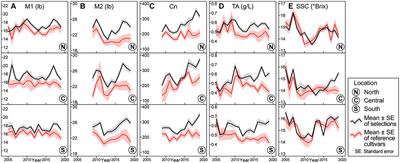ORIGINAL RESEARCH
Published on 06 Oct 2022
Multi-environment genomic prediction for soluble solids content in peach (Prunus persica)

doi 10.3389/fpls.2022.960449
- 2,374 views
- 4 citations
5,939
Total downloads
26k
Total views and downloads
You will be redirected to our submission process.
ORIGINAL RESEARCH
Published on 06 Oct 2022

ORIGINAL RESEARCH
Published on 21 Mar 2022

ORIGINAL RESEARCH
Published on 04 Mar 2022

ORIGINAL RESEARCH
Published on 02 Mar 2022

ORIGINAL RESEARCH
Published on 14 Feb 2022

ORIGINAL RESEARCH
Published on 08 Nov 2021

ORIGINAL RESEARCH
Published on 18 Oct 2021

ORIGINAL RESEARCH
Published on 09 Jul 2021

